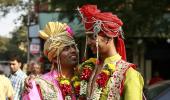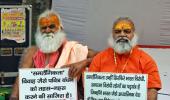Observing that the right to marriage is not a fundamental right, Chief Justice DY Chandrachud said on Tuesday the State has an obligation to recognise the “unions” of queer people and grant them benefit under the law.

The CJI, who was part of a five-judge constitution bench which unanimously refused to accord legal recognition to same-sex marriage under the Special Marriage Act, passed a slew of directions to stop discrimination against queer couples and said, “the state has an obligation to recognize such unions and grant them benefit under law”.
“The Constitution does not expressly recognize a fundamental right to marry. An institution cannot be elevated to the realm of a fundamental right based on the content accorded to it by law. However, several facets of the marital relationship are reflections of constitutional values including the right to human dignity and the right to life and personal liberty,” the CJI said.
Penning a separate 247-page verdict, the CJI elaborately dealt with several aspects pertaining to same-sex marriage and said, “In Article 15(1), the word ‘sex' must be read to include ‘sexual orientation' not only because of the causal relationship between homophobia and sexism but also because the word ‘sex' is used as a marker of identity which cannot be read independent of the social and historical context.”
“The right to enter into a union cannot be restricted based on sexual orientation. Such a restriction will be violative of Article 15. Thus, this freedom is available to all persons regardless of gender identity or sexual orientation,” he said.
The CJI, however, was of the view that it is within Parliament's ambit to change the law for validating such union of queer couples.
Justice Chandrachud, in his judgement, came down heavily on the Centre's vehement submission that the concept of same-sex marriage is an urban elitist concept and said, “Queerness is a natural phenomenon known to India since ancient times. It is not urban or elite”.
His verdict also dealt with the concept of marriage and said, “There is no universal conception of the institution of marriage, nor is it static. Under Articles 245 and 246 of the Constitution read with Entry 5 of List III to the Seventh Schedule, it lies within the domain of Parliament and the state legislatures to enact laws recognizing and regulating queer marriage.”
Justice Chandrachud said the apex court is vested with the authority to hear this case under Article 32 and it has the power to issue “directions, orders, or writs” for the enforcement of the fundamental rights.
“The freedom of all persons including queer couples to enter into a union is protected by Part III of the Constitution. The failure of the state to recognize the bouquet of entitlements which flow from a union would result in a disparate impact on queer couples who cannot marry under the current legal regime. The state has an obligation to recognize such unions and grant them benefit under law,” the judgement said.
The CJI, with whose verdict Justice Sanjay Kishan Kaul concurred, directed the Centre, state governments and Union Territories to “ensure that the queer community is not discriminated against because of their gender identity or sexual orientation”.
“Ensure that there is no discrimination in access to goods and services to the queer community, which are available to the public,” said the judgement.
It ordered the authorities to take steps to sensitise the public about queer identity, including that it is natural and not a mental disorder, and asked them to establish hotline numbers that the queer community can contact when they face harassment and violence in any form.
“Establish and publicise the availability of ‘safe houses' or ‘Garima Grehs' in all districts to provide shelter to members of the queer community who are facing violence or discrimination,” the judgement said.
Justice Chandrachud directed the government authorities to ensure that treatment offered by doctors or other persons, which aim to change gender identity or sexual orientation are ceased with immediate effect.
“Ensure that inter-sex children are not forced to undergo operations with regard only to their sex, especially at an age at which they are unable to fully comprehend and consent to such operations,” the verdict said.
It asked the authorities to recognise the self-identified gender of all persons including transgender persons, hijras, and others with socio-cultural identities in India, as male, female, or third gender.
“No person shall be forced to undergo hormonal therapy or sterilisation or any other medical procedure either as a condition or prerequisite to grant legal recognition to their gender identity or otherwise,” the judgement said.
“The appropriate Government under the Mental Healthcare Act must formulate modules covering the mental health of queer persons in their programmes under Section 29(1). Programmes to reduce suicides and attempted suicides (envisaged by Section 29(2)) must include provisions which tackle queer identity,” it said.
It also issued a slew of directions to the police, saying there shall be no harassment of queer couples by summoning them to the police station or visiting their places of residence solely to interrogate them about their gender identity or sexual orientation.
The police shall not force queer persons to return to their natal families if they do not wish to return to them, the judgement said.
“When a police complaint is filed by queer persons alleging that their family is restraining their freedom of movement, they shall on verifying the genuineness of the complaint ensure that their freedom is not curtailed,” Justice Chanrachud directed.
“When a police complaint is filed apprehending violence from the family for the reason that the complainant is queer or is in a queer relationship, they shall on verifying the genuineness of the complaint ensure due protection,” it said.
The CJI said marriage has attained significance as a legal institution largely because of regulation by the state, and by recognising a relationship in the form of marriage, the state grants material benefits exclusive to marriage.
The verdict also said the top court cannot strike down the constitutional validity of the Special Marriage Act because of its institutional limitations.
“This Court cannot read words into the provisions of the SMA and provisions of other allied laws ... because that would amount to judicial legislation. The Court in the exercise of the power of judicial review must steer clear of matters, particularly those impinging on policy, which fall in the legislative domain,” it said.
Chief Justice Chandrachud held one of the guidelines of the Central Adoption Resource Authority prohibiting unmarried and queer couples from adopting as unconstitutional and illegal.
“The CARA Circular disproportionately impacts the queer community and is violative of Article 15,” the CJI said, adding “The Union government, state governments, and governments of Union Territories shall not discriminate against the freedom of queer persons to enter into union with benefits under law”.
The CJI then recorded the assurance of the solicitor general that the Centre will constitute a committee chaired by the cabinet secretary for the purpose of “defining and elucidating the scope of the entitlements of queer couples who are in unions”.
The verdict said the Committee shall, before finalising its decisions, conduct wide stakeholder consultation among persons belonging to the queer community including those from marginalised groups and with the governments of the states and UTs.










